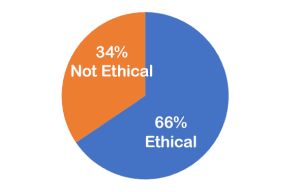This is the September 2022 edition of our monthly series of Ethics case studies titled What Do You Think? This series is comprised of case studies from NSPE archives, involving both real and hypothetical matters submitted by engineers, public officials and members of the public.
Your peers and the NSPE Board of Ethical Review have reviewed the facts of the case as shown below. And, here are the results.
Your opinion has been registered for the September 2022 edition of our monthly series of Ethics case studies titled What Do You Think?
Your vote is recorded as:

Want to know how your peers voted? We’ll send you an email with the poll results on Septmeber 27.
Your opinion has been registered for the Sepember 2022 edition of our monthly series of Ethics case studies titled What Do You Think?
Your vote is recorded as:

Want to know how your peers voted? We’ll send you an email with the poll results on September 27.
A Review of the Facts
Engineer Arthur, a principal in a local consulting engineering firm, practicing as a professional corporation, who also is a principal owner in a construction contracting firm, prepared plans and specifications for the design and construction of a conventional/non-proprietary roof structure for a municipal wastewater treatment facility. The scope of his services was limited to this project only. The municipality engaged a second firm, Engineer Ralph, to administer the bidding and construction, using the plans and specifications prepared by Arthur. The project was advertised for public bidding, and bids were received and opened. One of the bidders was Arthur’s construction contractor firm.
Was it ethical for Arthur to bid as the general contractor on a project Arthur designed?
Here is the result of our survey of your peers:

Applicable NSPE Code References:
Code III.4.a
Engineers shall not, without the consent of all interested parties, promote or arrange for new employment or practice in connection with a specific project for which the engineer has gained particular and specialized knowledge.
Code III.8.a
Engineers shall conform with state registration laws in the practice of engineering.
Discussion
The Board has had an opportunity to discuss the question of conflicts of interest in connection with so-called “Turnkey Procedures” on at least one other occasion. In BER Case 76-9, Engineer Jones was retained by a public agency to develop technical guidelines for an incinerator facility at a major government installation. Following submission, approval, and payment to Jones for the technical guidelines, the public agency owner decided it wanted to proceed with the design and construction by a “turnkey” method of one entity providing both the design and construction. The owner requested Jones to participate in this approach through a joint venture arrangement with a construction contractor, or preferably, by performing the design function as a subcontractor to the construction contractor; or if he preferred, to bid the complete “turnkey” contract and subcontract the construction to a construction company.
In any of these arrangements, the owner proposes to secure bids for the design and construction. In concluding that Jones may ethically participate in the enterprise through any of the design/construction procedures stated, the Board noted (addressing the question of conflict of interest) that it could find nothing in the Code that stands for the proposition that engineers may not engage in design/construct or “turnkey” procedures. The Board cited that the conflict of interest provisions in the Code are not controlling by its terms because the owner not only has knowledge of the possibility of a conflict through a business relationship of the parties, but is, in fact, the moving party desiring the design/construct method.
In BER Case 76-9, the Board proceeded to note that there was no apparent basis under the facts to be concerned about the business relationship influencing the judgment or the quality of services of the engineer because he will jointly with the contractor have the duty to provide the owner with quality engineering services, which are basic to sound construction.
While there are obvious differences in the facts, in some respects, there are basic similarities between BER Case 76-9 and the present case. In both cases, the engineers were involved in either the development of technical design guidelines or plans and specifications for a client on a specific project and later were offered the opportunity to lead the construction effort on the same project.
From the facts of this case, it is clear that Arthur, by being involved in the design of the roof structure for the municipal utility system, has become thoroughly knowledgeable about the plans, specifications, drawings, and financing of the project and will have a material and arguably unfair competitive advantage over other contractors who submit bids on the project. Also, although there is nothing in the facts to suggest this possibility, Arthur could potentially be exposed to criticism that his firm designed a roof structure system that either specified or contained performance criteria that were coordinated with a potential proposal by Arthur’s construction contracting firm.
Finally, while not stated in the facts, there appears to be a possible implication that among the reasons why Arthur may have been engaged for design services only was the fact that the laws of the jurisdiction in which the work is being performed precluded Arthur from performing the work under a “design/build” arrangement and that Arthur’s “limited engagement” effectively permitted Arthur to bid the work as the contractor through a de facto design/build arrangement (See Code III.8.a.). If the purpose of this arrangement was merely to serve as a subterfuge to allow Arthur the opportunity to evade a legal restriction on design/build and provide Arthur with a competitive advantage, the Board of Ethical Review would have serious concerns about this arrangement since it is clear that such an arrangement would undermine procedures at least arguably intended for the protection of the public.
On the other hand, the Board would not be less concerned if the laws of the jurisdiction permitted a design/build contracting arrangement. While design/build has become an accepted and established project delivery system that identifies single-point responsibility for design and construction services, and most of the ethical objections to design/build concerning the engineer’s obligation to the client have been clarified, strict adherence to federal, state and local design/build procedures are critical to assure the protection of the public and the administration of fair and reasonable practices for designers and contractors. In this conclusion, the Board would note that many of the issues relating to conflicting loyalties and independent judgment addressed in the NSPE Board of Ethical Review decisions noted above can be addressed through full disclosure and the establishment of clear lines of communication and authority between and among the parties involved in the design/build process.
Moreover, engaging the services of a separate engineer, Ralph, to administer the bidding and construction phase, will presumably establish a degree of objectivity and impartiality over the process and result in an ongoing independent review of the plans and specifications for the benefit of the client. Gaining the benefit of the design engineer’s thorough knowledge and understanding of the plans and specifications as part of the construction team is an option a client should be able to consider.
The Ethical Review Board’s Conclusion

It is ethical for Arthur to bid as the general contractor on a project Arthur designed under the facts presented, as long as the process followed was not a subterfuge to evade the requirements of state and local procurement, licensure laws, and disclosures or consent of all interested parties contained.
BOARD OF ETHICAL REVIEW
Lorry T. Bannes, P.E., James G. Fuller, P.E., Donald L. Hiatte, P.E., Joe Paul Jones, P.E., Paul E. Pritzker, P.E., Richard Simberg, P.E., C. Allen Wortley, P.E., Chairman
Note – In regard to the question of application of the Code to corporations vis-a-vis real persons, business form or type should not negate nor influence conformance of individuals to the Code. The Code deals with professional services, which services must be performed by real persons. Real persons in turn establish and implement policies within business structures. The Code is clearly written to apply to the Engineer and it is incumbent on a member of NSPE to endeavor to live up to its provisions. This applies to all pertinent sections of the Code. This opinion is based on data submitted to the Board of Ethical Review and does not necessarily represent all of the pertinent facts when applied to a specific case. This opinion is for educational purposes only and should not be construed as expressing any opinion on the ethics of specific individuals. This opinion may be reprinted without further permission, provided that this statement is included before or after the text of the case.









This is still borderline ethical since engineer Arthur had insight to project details that may beneifit him over another firm during the bidding process.
Note that Arthur’s construction company submitted a bid; no information was presented to indicate that his was only bid. Owner is perfectly within right to award construction contract to any of the bidders, or none. Now, in interest of avoiding any sense of conflict of interest, Arthur should make his ownership of that construction company known to Owner and contracting Engineer. Should they then decide to award contract to Arthur’s company, it is with full knowledge and understanding and is no way due to any illicit or unethical practices on Arthur’s part.
I would think the municipality would have language in their bid documents to define whom is qualified to submit bids on their projects. If they didn’t want the Engineer of Record to be allowed to bid this would have been stated.
It is vertical integration of sorts. Also, the bid process is being managed by a third party – presumably non biased (unless they are in cahoots).
Ethical, but an opportunity for other bidders, should Arthur’s bid be successful, to voice concern, unfounded or not, that Author had an advantage. Unless it was important for some reason for Arthur Construction to bid this, avoiding the appearance of possible conflict of interest seems like the better path.
Since the bidding process was conducted by a third party and the bids were based upon plans and specifications that were available to all bidders, I voted this as ethical. With regard to Arthur’s specialized knowledge, there are all sorts of competitive advantage. It could be other bidders had extensive experience with this type of roofing system, had economies of scale, favorable labor contracts, etc.
Be careful what you wish for in pursuit of perfect ethics.
Of the two portions of the job, it is likely that the construction is far more profitable than the design. Carried to its logical, market-driven conclusion, we might very well end up with plenty of contractors, but no designers.
Further, I’d much rather have a designer who is very closely aligned with the construction process versus a Frank Gehry who was totally disconnected from cost-effective reality.
Another important factor not considered here is whether Arthurs’s relationship with the construction firm was disclosed or otherwise known during this process. In my opinion, full disclosure avoids any appearance of impropriety.
to my understanding is whether Arthur, upon submitting his construction bid, the disclosure of his design involvement to the bid administrator and to the municipality of his intent involving the construction beyond his initial agreement. Both information were not discussed within the narrative of the panel description.
still cannot feel this is ethical with a duality without disclosure.
So, what happens if there turns out to be some ambiguity or other question, changed circumstances, design flaw, value engineering proposal, or so forth in the project? Won’t the engineer administering the contract want to turn to the designer for clarification? That, it seems to me, will create a clear conflict of interest.
Being the EOR for the project, Arthur would be required to review Special Inspection reports and submittals required by the project specifications. So Arthur would be reviewing and approving 3rd party inspection reports and submittals provided by Arthur’s construction company. How likely is it that he would not approve his own submittal or approve a discrepancy discovered by the inspector?
If the project were a Federal project, the Brooks Act (which is Federal law) would prevent a designer (usually termed Architect-Engineer Title I contractor) from performing construction services. The only exception to the Brooks Act is if a design-build process were authorized for the project by the Federal Agency overseeing the project. Hence, Arthur would probably have violated Federal law if it were a Federal project.
Even worse than that, if any competitor to Arthur’s construction company found out that Arthur had “inside information” on the plans, specifications, etc., well prior to the construction bidding period starting, a bid protest would most likely be filed with the Federal Claims Court, an Agency’s Board of Contract Appeals, or through the Government Accountability Office, with the most likely outcome that Arthur’s construction company had an unfair advantage and/or “insider information” and Arthur’s construction company’s bid being disqualified, with the next best bidder being awarded the construction contract.
Ethics aside, the practice is unfair to other construction contractors spending perhaps $1000’s to prepare a bid package.
William Forbes and Steve above pose an interesting question / scenario. I would like to take this a step further. Let’s say that during construction Arthur who is now both the Engineer of Record and the Contractor realizes that his design is inadequate or needs modification. Under normal circumstances, a Contractor would submit an RFI or similar and possibly request a change order for additional cost. Being that Arthur is assuming both roles, I would assume that the cost of any modifications would be born by him.